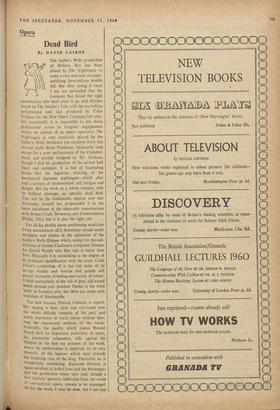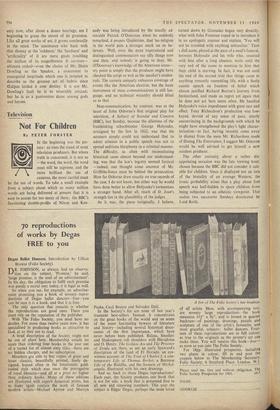OreLa Dead Bird
By DAVID CAIRNS
THE Sadler's Wells production of Edipus Rex has been joined by The Nightingale to make a very neat and, on paper, satisfying Stravinskyan double bill. But after seeing it twice I am not persuaded that the company has found the right combination (the ideal piece to go with CEdipus would be The Soldier's Tale, with the marvellous performance and cast produced by Colin Graham for the New Opera Company last year; but presumably it is impossible to pin down professional actors to irregular engagements within the scheme of an opera repertory). The Nightingale is very sensitively played by the Sadler's Wells Orchestra (on excellent form this season) under Brian Priestman, adequately sung except for a poor performance of the Chamber- maid, and prettily designed by Mr. Graham, though I find his production of the second half fussy and inelegant. It is full of fascinating noises—like the ingenious whirring of the mechanical Japanese nightingale—which after half a century of 'orchestration' still intrigue and delight. But the work as a whole remains, with Its brilliant plumage, an operatic dead bird. This will be the fashionable opinion now that Stravinsky himself has propounded it in the latest instalment of the admirable conversations with Robert Craft, Memories and Commentaries (Faber, 25s.); but it is also the right one.
For all his phobia about performing musicians ('vain excrescences all'), Stravinsky would surely recognise and rejoice in the splendour of the Sadler's Wells CEdipus which, except for the sub- stitution of Stanley Clarkson's competent Tiresias for David Ward's very fine one, is better than ever. Musically it is astonishing in the degree of its profound identification with the score. Colin Davis's conducting of it has lost none of its savage vitality and tension and gained still greater humanity of feeling and variety of colour; 1 think particularly of the veil of grey, still sound which spreads over pestilent Thebes at the word `urbe' in Jocasta's aria; but there are many such moments of illumination.
The new Jocasta, Patricia Johnson, is superb. Her singing is firm, clear and rich-toned over the whole difficult compass of the part, and subtly expressive in vocal colour without blur- ring the marmoreal outlines of the music. Ironically, the quality which makes Ronald Dowd such an impressive performer of opera, his passionate vehemence, tells against his (dipus in the first ten minutes of the work, where his performance is deprived, by its very intensity, of the hauteur which must precede the headlong ruin of the king. Thereafter he is wonderfully convincing. Raimund Herincx is again excellent as both Creon and the Messenger, and the production wears very well, though a few 'realistic' gestures, infiltrated from the world of conventional opera, remain to be expunged. As for the work, 1 may be slow, but 1 see that
only now, after about a dozen hearings, am I beginning to grasp the extent of its greatness. Like all great works of art, it grows continually in the mind. The minimuses who buzz with thin dismay at the 'coldness,' the 'hardness' and 'artificiality' of it are mere gnats troubling the surface of its magnificence. It survives— ultimate ordeal—even the choice of Mr. Denis Dowling as the Speaker, a monument to managerial ineptitude which one is tempted to describe as the greatest act of hubris since (Edipus lorded it over destiny. It is not Mr. Dowling's fault he is so miserably miscast; but he is as a pantomime dame among gods and heroes.















































 Previous page
Previous page